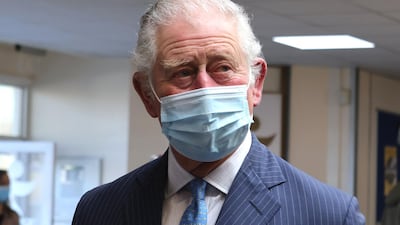Britain's Prince Charles called for an integrated approach to medicine, similar to the one being used to control the coronavirus pandemic, in an article in the Future Healthcare Journal on Tuesday.
He suggested that the same method based on science, public policy and personal behaviour should be used to tackle chronic health issues in society.
The prince, who is next in line to the British throne, took the opportunity to praise the healthcare profession's response to the pandemic, including vaccine researchers, public authorities, volunteers and the wider National Health Service community.
“I believe we must integrate the treatment of disease with the prevention of disease, and the subsequent improvement in people's lifestyles, genuinely to promote national health and not just remediate national illness.
"Whatever we do to improve the health of an individual should be matched with our attempts to improve the health of whole communities and, on a larger scale still, we should aim for a better balance between short-term economics and the long-term good of the planet," Prince Charles said.
He also touched on the importance of diet, noting that an increasing number of people were seeking to buy and eat seasonal, organic food.
Prince Charles claimed that accounting systems and economic forces that did not consider social and environmental factors encouraged producers and retailers to offer less healthy food, because it was cheaper.
In environmental terms, this led to unsustainable farming practices that provided short-term profit but depleted the soil of its rich microbiome, just as unhealthy food depleted our own internal human microbiomes, he said.
“Without an integrated approach, I cannot see how we can ever tackle these problems.
“I am not saying that medicine needs to join debates on sustainable farming and financial penalties and subsidies, but it seems to me that doctors have a crucial role in affirming the importance of good quality food just as they do good quality medicines,” he said.
Prince Charles said that he had been a long-time advocate of social prescribing – a holistic approach to health and well-being, under which health professionals refer patients to support in the community.
“In particular, I believe that social prescription can bring together the aims of the health service, local authorities, and the voluntary and volunteer sector.
"Biomedicine has been spectacularly successful in treating and often curing disease that was previously incurable – yet it cannot hold all the answers," the Prince of Wales said.
“Social prescription enables medicine to go beyond pills and procedures and to recognise the enormous health impact of the lives we lead and the physical and social environment within which we live.”
He said that NHS guidelines on pain acknowledged the role of acupuncture and mindfulness, and he hoped this would lead to a more fruitful discussion on the role of complementary medicine in the health service.
Prince Charles concluded by saying: "I believe that future medicine will need to go beyond integrating treatment for the individual patient, whether it be a conventional, complementary or lifestyle approach.
“I believe it is so important that the medical community rises to these challenges and takes on an extended role in enabling healthier and happier communities in a more joined-up world, in which we are all individually and collectively enabled to live healthier lives.”


